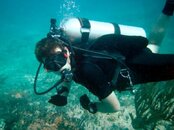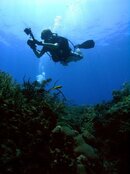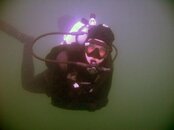How precise do you need to be? Good grief, man. You're doing an ascent with an OOA diver. This isn't a situation that requires anything that resembles precision. Just get to the surface safely.
Given the number of accident reports, that detail diver separation during OOA ascent as a factor in drowning fatalities, I would suggest that some precision buoyancy control is actually
quite critical.
This is a common problem that I encounter with regular frequency when conducting diver training. One diver buoyant - floating and kicking up, the other diver negative - sinking down. The buoyant diver ends up 'dragging' their buddy upwards on ascent. It then only takes
an instant of broken contact for the divers to separate, and the victim to lose their air supply.
If I had a dollar for every 'lost contact' I've seen on an OW or rescue training drill....
Fair enough. I just don't see how an octo-inflator makes the situation any worse.
Close proximity increases stress.
Unintentional contact increases stress.
Bubble in the face increases stress.
Limited neck mobility increases stress.
Having to incorporate a new procedure for buoyancy control causes stress.
Being out of air causes stress
Having an out of air buddy causes stress
There is rarely a single catastrophic event that causes a stress overload and panic reaction. It is typically caused by a mounting series of minor 'discomforts' that pushes a diver closer and closer to the thresholds of their comfort zone. Once beyond that zone, any additional tasking, stimulus or challenge can be enough to invoke a panic 'fight or flight' mentality. Underwater... it is normally the 'flight' option that prevails.
At that stage, the air-share becomes an irrelevance and a very fine line exists where a diver can get into serious harm.
For an experienced diver, well-versed and familiar with their kit and emergency procedures... then those stress factors will not be an issue.
For a novice diver, whose comfort zone/panic threshold is much smaller...and any stimulus/challenge causes more stress.... then all these 'little factors' that may apply to using an AIRII can contribute to their adverse psychological loading.
And it's also entirely possible that the panicked, novice diver would like having their buddy close. Have you seen one of these situations? Have you asked a novice OOA diver after on of these emergencies? I really think there are a lot of assumptions being made here.
Yes, I have.
Yes, I have.
No, no assumptions are being made.
What in the world are you talking about? Look at your dive gear man. It's all "O-Rings and lots of plastic."
Which, to be fair, isn't
yanked on. The pull-dump LPI hoses are.
Again...add a little panic to the mix...and see what happens....
I'm not calling the scenarios balderdash, just the difficulty of using an AirII. My son practices air share in various scenarios, and he does not experience any of the difficulties proposed by those that don't use an AirII...trouble venting his BC during ascent while air sharing?...nope...difficulty in monitoring his guage data?...nope...any of the other difficulties imagined in this thread?...nope.
If people don't prefer the AirII, I don't blame them for having their preferences, but I do still call balderdash on it being a difficult piece of gear to use in OOA scenarios...for any level diver.
AGAIN.... have
you... or
he.... ever done an air-share for real. You are misleading yourself, if you think that air-sharing with a stressed diver, in real circumstances
in any way replicates the psychological state that exists in a practice session.
I'm not talking about the
mechanical aspects of the procedure... I am talking about the psychological stressors that exist in a real situation.
Read the BSAC incident reports...and you'll spend the whole time wondering "
how the hell did that happen?!?". Simple situations become deadly because of psychological stressors.
Comparing a real rescue to a rescue training practice is about applicable as comparing sunday morning paintballing to Taliban ambush.
It's easy for a person to delude themself about how they will react in a high-stress, dangerous scenario - based on their imagination, hypothesis or some sort of 'replication' within a controlled (unstressful) scenario.
I consider myself very well trained... practicing, demonstrating and reviewing scuba emergency procedures has been part of my day-to-day life for many years. That said, I still don't over-estimate my own abilities to deal with real situations. When I have had to deal with real emergencies; many
real OOA scenarios, assisting divers who've gone into deco, divers getting severe narcosis when deep into wreck penetrations, non-diving related medical issues occuring underwater, drownings and panicked divers on the surface and underwater - it has always been a testing challenge... and none of which I would
now be complacent about.
If you assess why you feel that an air-share would be 'easy'.... is this based on assumption, or based on actual experience?
I just thought I'd bring this up again. For the life of me I cannot understand why divers who insist on not applying a gear solution to a skills problem can get hung up for pages arguing the minutiae of equipment usage.
And, isn't this the advanced forum? Why has this all boiled down to how the inexperienced diver will respond. Is that the new benchmark? By that reasoning everybody should chuck their BP/W's, longhoses and manifolded doubles because the majority of new divers haven't been exposed to those either.
Diving is a personal endevour, sometimes shared with another individual or small group. If it works within those parameters it works. trying to manage the experience of the "great unwashed masses" begins to sound a.) a little arrogant and b). like socialism... Is that what is being touted here?
Because the OP asked a question, which illicited answers.
Stated again:
I don't like AIRII
personally, because I don't like the functionality and asthetics of them. That is why I don't use one (any more).
I don't mind the AIRII
professionally, but I do feel that it has negative issues, which need to be addressed. Those issues are primarily relevant to less experienced divers, or divers with a less robust psychological comfort zone and weaker stress management capacity. That doesn't mean AIRII shouldn't be used... it just means that the negatives should be acknowledged and
if possible rectified by appropriate means (training).








